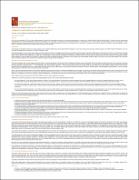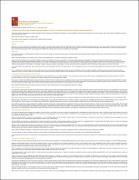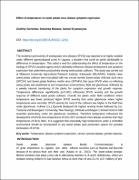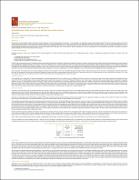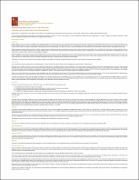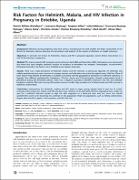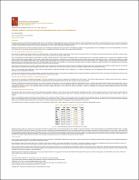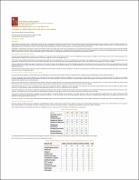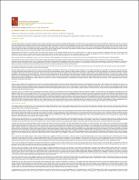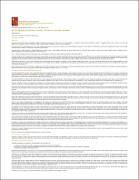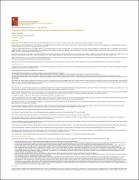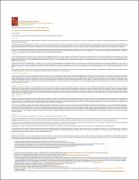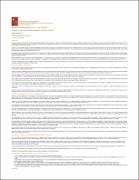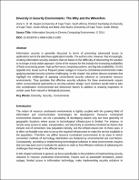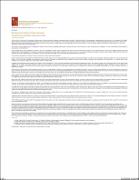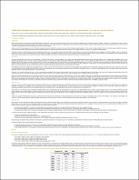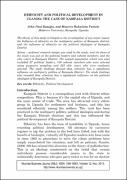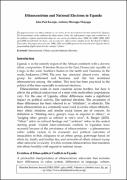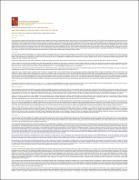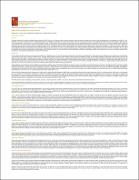Uganda Martyrs University Institutional Repository: Recent submissions
Now showing items 621-640 of 1009
-
Community Participation: An Abused Concept?
(Uganda Martyrs University, Department of Health Sciences, 2004-04)One of the main principles of PHC was community participation. However, the interpretation and practices of community participation are so diverse that it became different things to different people. The lessons from the ... -
From Alma Ata to Millennium Development Goals: To What Extent Has Equity Been Achieved?
(Uganda Martyrs University, Department of Health Sciences, 2004-04)Equity was a core value in the Alma Ata declaration on PHC. However, the interpretation of equity varied and its application became difficult. Equity goals and objectives have often been rhetoric rather than practical. ... -
Effect of temperature on sweet potato virus disease symptom expression
(Uganda Martyrs University, 2019)The incidence and severity of sweetpotato virus disease (SPVD) was reported to be highly variable under different agroecological zones in Uganda, a situation that could be partly attributable to differences in temperature. ... -
International Trade and Health: Before and After CANCUN
(Uganda Martyrs University, Department of Health Sciences, 2003-12)International trade is potentially critical in stimulating increased production, economic growth and poverty reduction. For this potential to be achieved, transparent and equitable international rules are necessary together ... -
Costing Health Services in Lacor Hospital
(Uganda Martyrs University, Department of Health Sciences, 2003-12)Health institutions all over the world are troubled by the intractable problems of shrinking resources and increasing demands for good quality services. Private-Not-For-Profit (PNFP) health units face even more serious ... -
Risk Factors for Helminth, Malaria, and HIV Infection in Pregnancy in Entebbe, Uganda
(Uganda Martyrs University, 2009)factors for infections informs planning of interventions and analysis of the impact of infections on health outcomes.To describe risk factors for helminths, malaria and HIV in pregnant Ugandan women before intervention in ... -
Unrest Over Health Sector Remuneration: What is the Problem?
(Uganda Martyrs University, Department of Health Sciences, 2003-12)Employee unrest over remuneration in the Ugandan health sector is an old problem. Although salaries have been increasing since 1990, the country has witnessed more strikes in this period than before. In fact, one has the ... -
A Review of Human Resource for Health in Uganda
(Uganda Martyrs University, Department of Health Sciences, 2003-12)The importance of human resources in health systems needs not to be over-emphasised. Expenditure on health workers forms a significant proportion of total health expenditure in many countries. In order to effectively ... -
Economic Impact of Lacor Hospital on the Surrounding Area
(Uganda Martyrs University, Department of Health Sciences, 2003-12)The health care industry is an important contributor to the economy, especially to that of the area surrounding health institutions. This effect is even more marked in the case of rural facilities. At national level, it ... -
Health Inequalities Within a Nation: a Review of Two New Theories
(Uganda Martyrs University, Department of Health Sciences, 2003-12)What policies and values influence inequalities of health of individuals and populations? There are two main interpretations: a “materialist”, and “psycho-social” (Coburn D, 2000). It is suggested that the more a regime ... -
Selective Salary Reward for Health Workers: Realistic or a Distortion?
(Uganda Martyrs University, Department of Health Sciences, 2003-12)Uganda’s civil service is perhaps one of those with some of the lowest salaries in the world. This has remained the case in spite of improvements in the pay package over the last decade. Staff working in the delivery of ... -
All That Glitters is Not “Macroeconomics”
(Uganda Martyrs University, Department of Health Sciences, 2003-12)Despite many problems, the Report on Macroeconomics and Health is an important document. It re-launches the role of the WHO, which in itself is a good thing, as the WHO is an organisation potentially more independent and ... -
Health Workers Demand for Better Pay
(Uganda Martyrs University, Department of Health Sciences, 2003-12)hough the recent health reforms which include decentralisation of health services and creation of ‘minihospitals’ at every sub-county indicate that Government is committed to improving the state of health services in this ... -
Diversity in Security Environments: The Why and the Wherefore
(Uganda Martyrs University, 2014)Information security is generally discussed in terms of preventing adversarial access to applications and to the data these applications handle. The authors note, however, that increasingly, creating information security ... -
Building Social Capital for Health Information
(Uganda Martyrs University, Department of Health Sciences, 2003-12)The concept of “social capital” has been re-engineered to reflect the level and use of knowledge within society. It includes the extent to which society can create, innovate and use knowledge. This new understanding of ... -
Competing Demands and Limited Resources in the Context of War, Poverty and Disease: the Case of Lacor Hospital
(Uganda Martyrs University, Department of Health Sciences, 2003)Difficult choices have to be made among competing demands for health care in the context of severely limited resources and persistent humanitarian crisis prevailing in Northern Uganda. In particular, the challenge of a ... -
Ethnicity and political development in Uganda:The case of Kampala District
(Uganda Martyrs University, 2014)The thrust of this study is hinged on the investigation of two major issues; the Influence of ethnicity on the multiparty politics of Kampala district, and the influence of ethnicity on the political ideologies of ... -
Ethnocentrism and National Elections in Uganda
(Uganda Martyrs Universityty, 2012)The paper focuses on ethnocentrism as an active factor for national election turmoil in Uganda. The bewitchment of the military by ethnocentric virus, the subsequent coups and overthrows, to the military regimes and ... -
ARV Treatment in Poor Settings: the State of the Art
(Uganda Martyrs University, Department of Health Sciences, 2004-04)Universal access to antiretroviral drugs (ARVs) has created enormous debate and controversy in developing countries. But it seems to be a more feasible prospect by the day. Prices of ARVs have dramatically come down, and ... -
AIDS, Primary Health Care and Poverty
(Uganda Martyrs University, Department of Health Sciences, 2004-04)This paper analyzes the complex interrelation between poverty and AIDS. Poverty, in its many and diverse aspects and with its many and diverse consequences, creates a fertile breeding ground for the expansion of HIV/AIDS. ...


